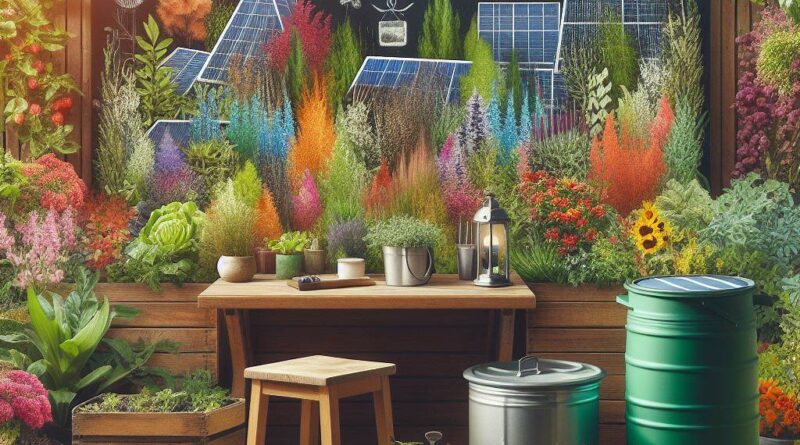9 Eco-Friendly Garden Ideas for Your Home
This post may contain affiliate links which means I may receive a commission for purchases made through links. As an Amazon Associate, I earn from qualifying purchases. Learn more on my Private Policy page.
Did you know that the average American household uses 320 gallons of water per day, with 30% of that going to outdoor use, primarily for watering lawns and gardens?
There are many eco-friendly garden ideas that can help you reduce your environmental impact and create a more sustainable outdoor space for your home. By implementing these practices, you can not only contribute to conservation efforts but also save on your water and energy bills.
Let’s explore some innovative and practical ways to transform your garden into an eco-friendly oasis that benefits both you and the environment.
Water Conservation Techniques
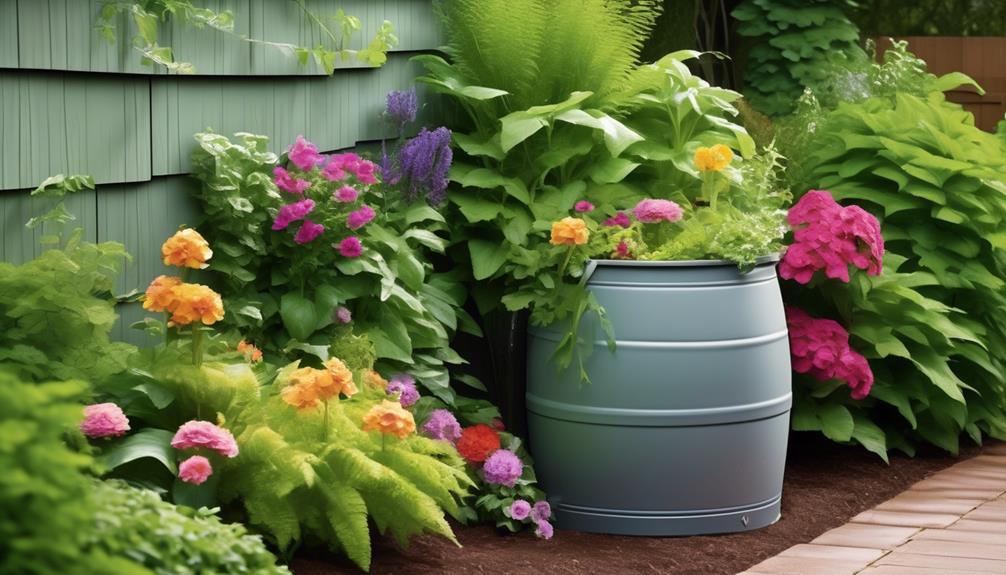
To conserve water in your eco-friendly garden, consider implementing drip irrigation systems for efficient and targeted watering of your plants. Drip irrigation delivers water directly to the base of plants, minimizing evaporation and water wastage. This method ensures that only the roots receive water, reducing the risk of weed growth and fungal diseases. It also promotes healthier plant growth by preventing foliage from getting wet, which can lead to certain plant diseases.
Additionally, drip irrigation systems can be easily automated with timers, allowing you to maintain a consistent watering schedule without the need for constant monitoring.
Another effective water conservation technique for your eco-friendly garden is the use of rain barrels. By collecting rainwater from your roof, you can harness a free and sustainable water source for your garden. Installing rain barrels can significantly reduce your reliance on municipal water supplies, especially during drier seasons. The collected rainwater can then be used for various garden purposes, including watering plants, washing gardening tools, and cleaning outdoor spaces. This not only conserves water but also reduces your water bill and lessens the burden on local water resources.
Incorporating drip irrigation systems and rain barrels into your eco-friendly garden not only minimizes water usage but also promotes sustainable and responsible gardening practices. These techniques not only benefit your garden but also contribute to the conservation of precious water resources in your community.
Organic Pest Control Methods
Consider implementing organic pest control methods in your eco-friendly garden to protect your plants and further enhance sustainable gardening practices. By using natural repellents and attracting beneficial insects, you can effectively manage pests without relying on harmful chemicals.
Natural repellents such as garlic, neem oil, and diatomaceous earth can deter a wide range of pests including aphids, slugs, and caterpillars. These repellents are safe for the environment and don’t pose any risk to humans or animals.
Another effective method is attracting beneficial insects like ladybugs, lacewings, and parasitic wasps. These insects are natural predators that feed on common garden pests, keeping their populations in check. You can lure them into your garden by planting flowers such as dill, fennel, and marigold, which provide nectar and pollen for these beneficial insects. Creating a diverse and balanced ecosystem in your garden will help naturally control pest populations while supporting biodiversity.
Additionally, practicing good garden hygiene by regularly removing dead or diseased plants, and keeping the garden area clean can prevent pest infestations. It’s also essential to rotate crops and practice companion planting to disrupt pest life cycles and confuse them with a variety of scents and colors.
Sustainable Planting Practices
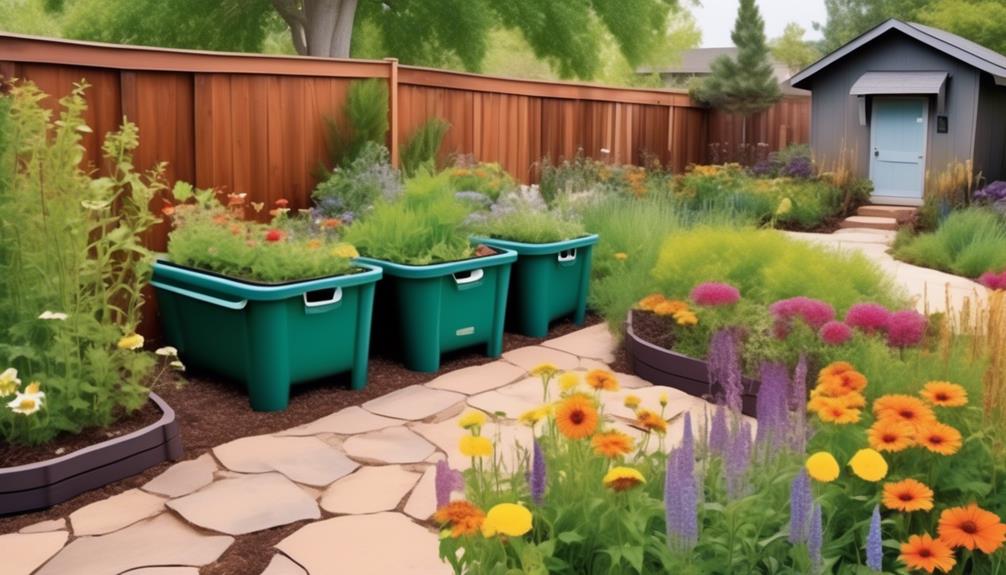
When planning your eco-friendly garden, prioritize sustainable planting practices to promote long-term environmental health and productivity. By incorporating permaculture principles and utilizing eco-friendly fertilizers, you can create a thriving garden that benefits both the environment and your home.
Here are some sustainable planting practices to consider:
- Polyculture Planting: Instead of monoculture planting, which involves growing a single crop in a field, consider polyculture planting. This method involves growing a variety of plants together, which can help improve soil fertility, reduce pests, and create a balanced ecosystem.
- Companion Planting: Take advantage of companion planting by growing mutually beneficial plants together. For example, planting marigolds alongside tomatoes can help deter pests, while planting legumes can enrich the soil with nitrogen.
- Crop Rotation: Implement crop rotation to prevent soil depletion and control pests and diseases. By rotating the types of crops grown in specific areas each season, you can maintain soil fertility and reduce the risk of plant-specific pests and diseases.
- Eco-Friendly Fertilizers: Use organic and eco-friendly fertilizers such as compost, manure, and organic mulch to nourish your plants while minimizing harmful chemical runoff into the environment.
Composting for Nutrient-Rich Soil
After implementing sustainable planting practices in your garden, you can enhance soil fertility and promote a balanced ecosystem by incorporating composting for nutrient-rich soil. DIY composting is a simple and effective way to recycle kitchen scraps, yard waste, and other organic materials into nutrient-dense compost for your garden. By creating your own compost, you not only reduce your household waste but also enrich your soil with essential nutrients.
Vermicomposting, a type of composting using worms, offers significant benefits for your garden. Worms break down organic matter, producing nutrient-rich castings that improve soil structure and fertility. This process also helps to increase microbial activity in the soil, promoting healthier plant growth and better water retention. Additionally, vermicomposting can be done indoors, making it a convenient option for those with limited outdoor space.
When you utilize compost in your garden, you’re not only providing essential nutrients to your plants but also contributing to the overall health of your garden ecosystem. Compost helps to balance soil pH, suppress diseases, and reduce the need for chemical fertilizers. It also encourages beneficial microorganisms and earthworms, which play a crucial role in maintaining soil health.
Incorporating composting into your gardening routine is a sustainable and cost-effective way to ensure that your plants thrive while reducing your environmental impact. Whether through DIY composting or vermicomposting, the benefits of nutrient-rich soil will be evident in the health and vibrancy of your garden.
Eco-Friendly Garden Design Tips
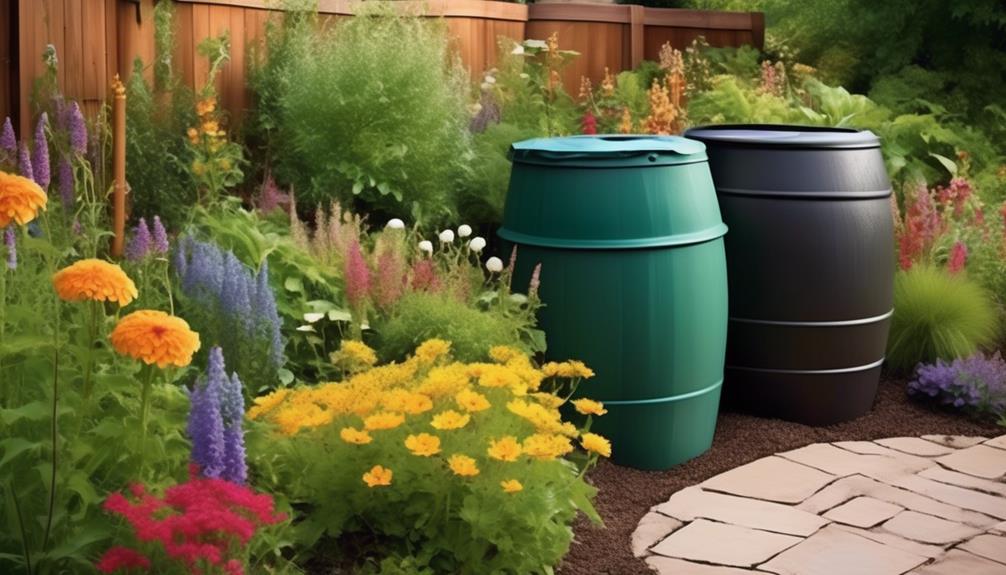
To create an eco-friendly garden design, prioritize incorporating native plants and maximizing biodiversity. By doing so, you can create a sustainable and thriving garden that benefits the local ecosystem. Here are some eco-friendly garden design tips to help you get started:
- Natural Landscaping: Utilize natural landscaping techniques such as xeriscaping, which focuses on using drought-tolerant plants to conserve water, and creating natural pathways using materials like gravel or wood chips instead of concrete or asphalt.
- Green Gardening: Embrace green gardening practices by using organic fertilizers and pesticides to minimize harm to the environment and promote healthy soil and plants. Collect rainwater in barrels to use for watering your garden, reducing reliance on traditional irrigation methods.
- Native Plant Selection: Choose native plants that are adapted to the local climate and soil conditions. Native plants require less water and maintenance, support local wildlife, and contribute to the overall biodiversity of the area.
- Biodiversity Enhancement: Incorporate a variety of plants, including flowers, shrubs, and trees, to attract diverse wildlife such as pollinators and beneficial insects. This will help create a balanced garden ecosystem and reduce the need for chemical interventions.
Energy-Efficient Outdoor Lighting
Consider incorporating solar-powered outdoor lighting fixtures to reduce energy consumption and minimize your environmental impact. Solar powered fixtures are an excellent choice for energy-efficient outdoor lighting. They harness the power of the sun during the day, converting it into electricity that powers the lights at night. This not only saves energy but also reduces your electricity bill.
LED bulbs are another essential component of energy-efficient outdoor lighting. They use significantly less energy than traditional incandescent bulbs and have a much longer lifespan, reducing the frequency of replacements and minimizing waste.
When choosing solar-powered fixtures, look for options that are designed to maximize sunlight absorption and energy conversion. Position the solar panels in areas where they can receive direct sunlight for optimal charging. Additionally, consider fixtures with motion sensors or timers to further conserve energy by only illuminating when needed.
Furthermore, solar-powered fixtures are easy to install and don’t require any wiring, making them a convenient and cost-effective choice for your eco-friendly garden. With a wide variety of styles and designs available, you can enhance the aesthetic appeal of your outdoor space while reducing your carbon footprint.
Upcycling and Repurposing in the Garden
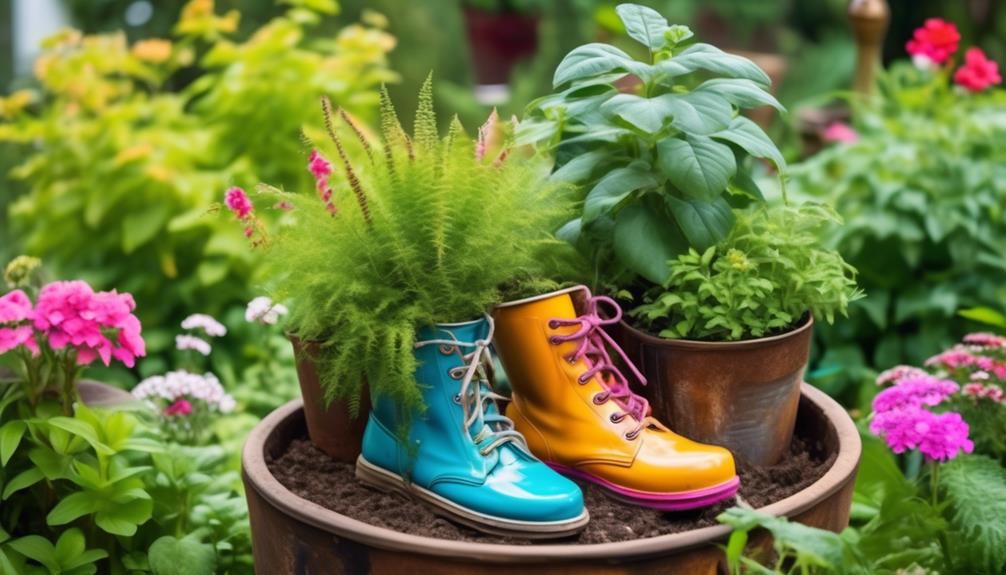
Looking for creative ways to give your garden a sustainable and unique touch? Upcycling and repurposing in the garden not only adds character but also contributes to a more sustainable environment. Here are some ideas to help you get started:
- Creative Container Gardening: Instead of purchasing new planters, consider upcycling old items such as tin cans, wooden crates, or even old boots to use as unique containers for your plants. Not only does this add a quirky touch to your garden, but it also reduces waste by giving new life to old items.
- Salvaged Material Sculptures: Embrace your creativity by using salvaged materials to create unique sculptures or garden art. Old metal pieces, driftwood, or even discarded ceramic tiles can be repurposed to add visual interest to your garden. By using salvaged materials, you’re not only reducing waste but also adding a personal and eco-friendly touch to your outdoor space.
- Repurposed Furniture: Give new life to old furniture by repurposing it into functional and decorative elements for your garden. An old wooden ladder can be transformed into a vertical garden, or a discarded bathtub can become a unique planter. This not only reduces the amount of furniture ending up in landfills but also adds a touch of whimsy to your garden.
- DIY Compost Bin: Upcycle old wooden pallets to create a DIY compost bin. This not only provides a sustainable way to manage organic waste but also enriches your garden soil with nutrient-rich compost, promoting healthy plant growth while reducing the amount of waste sent to landfills.
Native Plant Landscaping Ideas
Embrace sustainability and add a native touch to your garden by incorporating native plant landscaping ideas that not only enhance the environment but also complement your upcycled and repurposed garden elements.
One fantastic way to incorporate native plants into your landscape is by creating wildflower meadows. These meadows not only add a pop of natural color to your garden but also provide a habitat for various wildlife, including birds, bees, and butterflies. By using native wildflowers, you can create a low-maintenance and drought-resistant meadow that supports the local ecosystem.
Another native plant landscaping idea is to create pollinator gardens. These gardens are specifically designed to attract and nourish pollinators such as bees and butterflies. By planting native flowers, shrubs, and trees that provide nectar and pollen, you can create a haven for these essential creatures. Not only does this contribute to the preservation of pollinator species, but it also enhances the overall health and biodiversity of your garden.
Incorporating native plant landscaping ideas not only benefits the environment but also adds a unique and natural touch to your outdoor space. Whether you opt for the vibrant beauty of wildflower meadows or the buzzing activity of pollinator gardens, these native plant landscaping ideas are sure to elevate the sustainability and aesthetic appeal of your garden.
Frequently Asked Questions
How Can I Integrate Rainwater Harvesting Into My Eco-Friendly Garden?
You can integrate rainwater harvesting into your eco-friendly garden by installing a rain barrel to collect water and using it to irrigate your garden. This helps with water conservation and can be a smart addition to your garden design.
What Are Some Natural Alternatives to Chemical Fertilizers for Sustainable Planting?
When planting sustainably, consider natural mulching as an alternative to chemical fertilizers. Use organic pest control methods like companion planting and natural predators to maintain a healthy garden without harming the environment.
Can I Use Food Scraps From My Kitchen for Composting in My Garden?
You can definitely use food scraps from your kitchen for composting in your garden. It’s a great way to reduce waste and practice sustainable gardening. Just remember to avoid meat and dairy products in your compost.
Are There Any Eco-Friendly Options for Outdoor Garden Furniture and Decor?
You can find eco-friendly outdoor furniture and decor options that use sustainable materials and upcycled designs. Look for pieces made from reclaimed wood, recycled plastic, or bamboo for a stylish and environmentally conscious garden space.
How Can I Attract Beneficial Wildlife to My Eco-Friendly Garden?
To attract beneficial wildlife to your eco-friendly garden, try planting native flowers to attract pollinators and creating habitats like birdhouses and bee hotels. These simple steps can encourage biodiversity and promote a healthy garden ecosystem.
Conclusion
Now that you have these eco-friendly garden ideas, you can start creating a sustainable and beautiful outdoor space for your home.
By implementing water conservation techniques, organic pest control methods, sustainable planting practices, composting, eco-friendly garden design tips, energy-efficient outdoor lighting, upcycling, and native plant landscaping, you can contribute to a healthier environment while enjoying the benefits of a green and thriving garden.
Start making a positive impact today!
